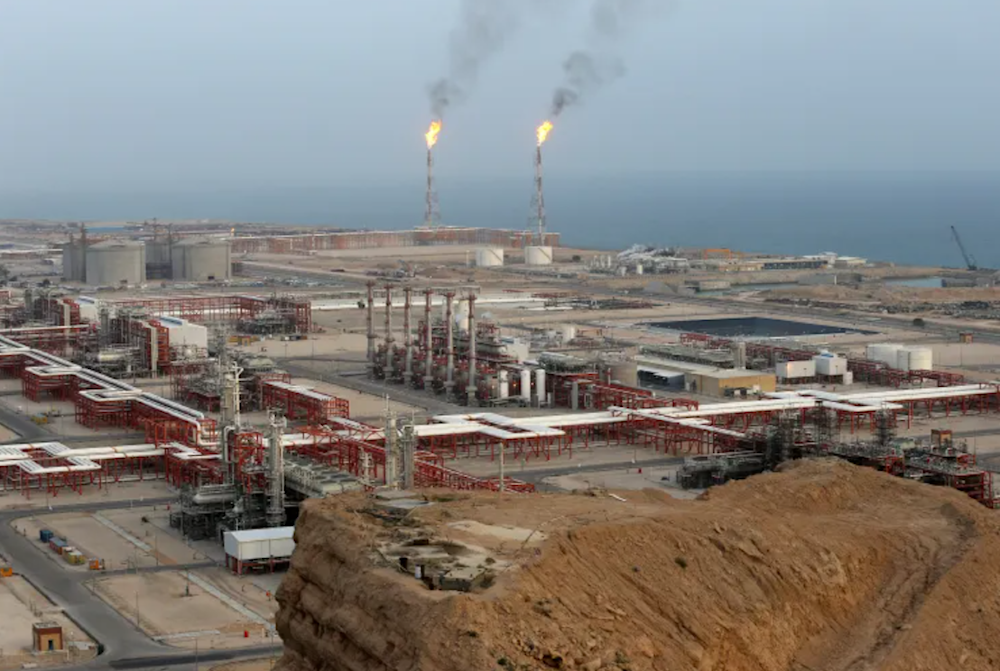Iran, Pakistan seek ways to complete long-delayed gas pipeline project
While Tehran asserts it has committed $2 billion to build the pipeline on its territory, Pakistan failed to start construction, citing international sanctions on Iran as the reason.
-

The South Pars gas field on the northern coast of the Gulf, in Asaluyeh, Iran (AP)
According to Iran's Consul General in Pakistan, Hassan Nourian, Pakistan and Iran are seeking options to conclude a long-delayed gas pipeline project, telling reporters Monday that Iran sees "determination from Pakistan to complete the project."
In 2010, the nations inked an agreement to build a pipeline from Iran's South Fars gas field to Pakistan's Balochistan and Sindh regions. Still, Pakistan's development has been stalled due to concerns over US sanctions.
The 1,900-kilometer (1,180-mile) pipeline was designed to provide 750 million to one billion cubic feet of natural gas per day for 25 years to fulfill Pakistan's increasing energy demands.
While Tehran asserts it has committed $2 billion to build the pipeline on its territory, Pakistan failed to start construction, citing international sanctions on Iran as the reason.
In 2014, Islamabad requested a 10-year extension to build the pipeline, which will expire in September of this year, and its caretaker administration got the green light this year to begin construction on an 80-kilometer stretch of the pipeline.
The United States has warned Pakistan of sanctions risks after the Islamabad administration struck security and commercial agreements with Iran during President Ebrahim Raisi's visit to the country.
US State Department Spokesman Vedant Patel told reporters at the time that although Pakistan can "speak to their own foreign policy pursuits," the US advises "anyone considering business deals with Iran to be aware of the potential risk of sanctions."
The US has maintained a maximum pressure sanctions policy on Iran and its friendly allies as punishment for collaborating.
Nourian stated on Monday that the pipeline was not subject to international constraints and that the two nations were debating the matter.
Pakistan, whose home and industrial users rely on natural gas for heating and energy, is desperate for inexpensive gas. Its reserves are rapidly depleting and LNG deals making supply prohibitively costly in the face of soaring inflation.
According to BP's Statistical Review of World Energy, Iran possesses the world's second-largest gas reserves, trailing only Russia, but Western sanctions have attempted to hinder its growth as an exporter.
Iran, Pakistan say colonial powers sabotaging bilateral ties
During a telephone conversation with his Pakistani counterpart Asif Ali Zardari in April, Iranian President Ebrahim Raisi stated that the development of bilateral ties between the two nations is being sabotaged by colonial powers.
While congratulating Zardari for winning a second term as Pakistan’s President, Raisi said, "The development of Iran-Pakistan relations is not agreeable to colonial powers, and they are seeking to drive a wedge between the two Muslim countries."
He continued that the joint fight against terrorism must be reinforced, and stressed that enemies should not be given the door to apply their agendas, as he described the Israeli genocide in Gaza as "great sadness" for Muslim nations, and called on independent nations to exert pressure against "Israel".
Meanwhile, Zardari congratulated Iran and its people on the occasion of Eid al-Fitr and condemned the Israeli airstrike on the Iranian Embassy in the Syrian capital city of Damascus.
“The vast cultural and historical similarities between the two countries are a suitable ground for the expansion of cultural, commercial, economic relations and the exchange of diverse and numerous capacities between the two sides,” the Pakistani President noted.

 4 Min Read
4 Min Read








